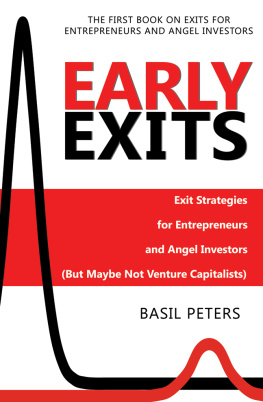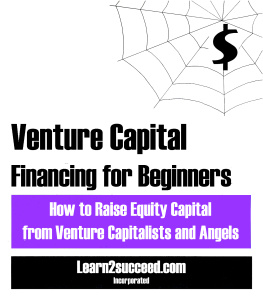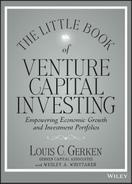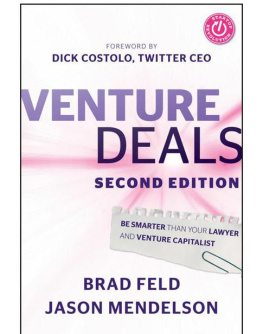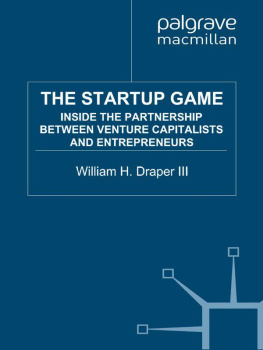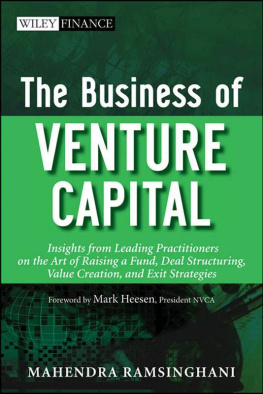
Early Exits
Exit Strategies for Entrepreneurs and Angel Investors (But Maybe Not Venture Capitalists)
Basil Peters
Acknowledgements
Writing is easy. All you do is stare at a blank sheet of paper
until drops of blood form on your forehead.-Gene Fowler
Over the years, I have had the opportunity to work with, and learn from, some of the very bestthese experiences and people helped build this book. The list is far too long to include here, but thank you all again.
I am grateful for the specific suggestions for this book from Bill Payne, Warren Hanselman, and Bruce MacCormack.
Tony Wanless, Bob Walsh, and Catherine Leek provided editing and invaluable coaching in taking the first draft to its final edition. Thanks to each of you for your professional contributions.
Finally, a special thanks to my partner, Linda Irvine (MeteorBytes), who worked tirelessly and efficiently with me to design and produce the final product.
1. Introduction
Exits are the least understood part of investingas often by the investors themselves as by the entrepreneurs. This book is about the large number of other exitsthe ones that are not driven by the VCs.
1.1 The End of the Swing For The Fences Era
As I prepare this book in late 2008 the worlds financial systems are in turmoil. Huge investment banks have become extinct, governments have rushed in with bailouts, initial public offerings (IPOs) have all but disappeared, the venture capital industry is in crisis and investors are holding on to their cash more tightly than they have in decades.
This chaos is, in part, a result of the swing for the fences thinking that has taken over much of the financial world in recent years. Everyones been looking for the big score, the billion-dollar payoutthe moon shot that would vault them into the ranks of big money.
That era is over. Sober thinking is now the rule of the day. The turmoil and this new way of thinking presents a new, and possibly even more exciting, opportunity for entrepreneurs and angel investors. The news may not be as good for traditional venture capitalists or the companies in which they invest.
This new reality extends trends that have been emerging for some time, but which have gone unnoticed amid all the noise about the big venture capital and private equity deals that were awash throughout North America.
A different financing landscape for entrepreneurs has been emerging over the past few years and will continue to evolve in this new financial climate. This new reality favors investments in promising young companies by angel investors, who will often achieve an exit within a few years instead of following the riskier, and much longer, funding patterns of the traditional venture capital industry.
The payoffs for this strategy are not as large as some of the earlier moon shots in the last few years of the 20th century, like Google, Skype or PayPal, but they come far more oftenand with much less risk. Cumulatively, these early exits provide a very attractive investment return for both angel investors and entrepreneurs.
Its similar to a baseball team concentrating on hitting consistent singles and doubles rather than hoping for the big grand slam home run to put them in the win category. Its old time ball playingand investingand its the complete opposite of the swing for the fences mentality that emerged over the past couple of decades. In that scenario, a company starts up, raises big venture capital funding, and after a decade or more of hard work, and a great deal of luck, eventually completes a multi-hundred million initial public offering (IPO).
My premise is that startups and emerging companies should adopt this new, simple approachstart small, stay lean, raise only the funding you really need, grow the business judiciously and then execute an early exit.
As far as I can tell, this is the first book on exits written for entrepreneurs and angel investors.
1.2 The First Book About Exits For Angels and Entrepreneurs Instead of Venture Capitalists
Exits are the least understood part of investingas often by the investors themselves as by the entrepreneurs. Thats because there has been very little said, or written, about them. The emphasis was always on starting, scaling and growing.
Most of the early books on exit strategies were written for business owners who wanted to retire. More recently, there have been a number of books written about exit transactions for venture capitalists. This is not surprising considering that most venture capital (VC) agreements give the VCs most, if not all, of the control in deciding when and how all shareholders benefit from an exit transaction.
This book is about the large number of other exitsthe ones that are not driven by the VCs.
Exit opportunities have changed dramatically in the past few years. Today, its more likely that a company will be sold without ever having an investment from a venture capitalist.
Exits are also happening much earlier than before. The largest number of exit transactions today are in the under $30-million valuation range. These exits are often completed when companies are only two or three years from startup.
The second quarter of 2008 was the first time in history that there were no IPOs of venture-backed companies in the US. At the same time, the market for merger and acquisition (M&A) transactions of technology companies was extremely active.
These trends created a terrible time for VCs but a great one for entrepreneurs and angels.
Most of the strategies and exits described in this book dont work for traditional VCs. In fact, I expect many VCs to react quite negatively to many of the observations and ideas presented. This is not surprising, as this is not good news for the traditional venture capital investment model.
In this era, the choices entrepreneurs and boards make between angel and VC investment will have profound effects on exit opportunities and probabilities of success.
This new exit reality has new rules and new opportunitiessome of which include:
- Exits occurring in only two or three years.
- Most transactions under $30 million.
- Small M&A markets are much less efficient (often a very good thing).
The goal of this book is to help entrepreneurs and angel investors have more successful, more frequent and more enjoyable exits.
2. Exits are the Most Fun
Exits are the best part of being an entrepreneur or investor. Its when we get financially rewarded for all of the creativity, hard work, investment and risk we put into our companies.
2.1 Why Exits Are Fun
There are many reasons we work. One of the obvious ones is to earn money, but money is not the most important reason. Money is often well down the list depending on the scale on which you measure. Most of us work to feel successful, to know we are useful, to have a sense of purpose and to have fun.
All work becomes boring eventually. After youve performed any business process well a few dozen times it can become numbing and routine. Your hundredth subordinate review, or sale of the same product to the same customer, can be worse than dental work.
After about my tenth exit, I figured out why I like working on them so muchexits are the most fun. Exits are the best part of being an entrepreneur or investor. Its when we get financially rewarded for all of the creativity, hard work, investment and risk we put into our companies.
2.1.1 There Is Always a Great Party
One of the other benefits is the big closing party.
Next page
